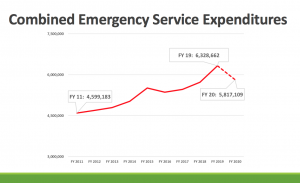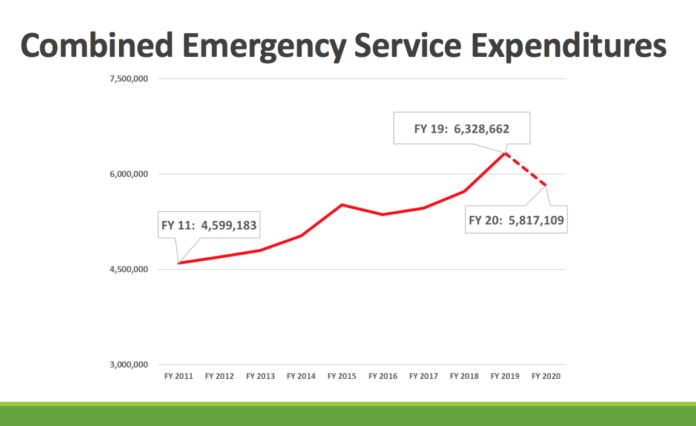Planners predict a $500,000 savings if Ketchum and Sun valley cities merge services
By Eric Valentine

Improved emergency services, facilities and equipment—all at a reduced cost now and over the long-term—is what Sun Valley’s and Ketchum’s city councils were promised should they merge their fire and police departments. The cities would see a $511,553 savings, presenters said, with the lion’s share—roughly $500,000—headed toward Sun Valley.
That means only a fraction of the cost savings would reach Ketchum, but the vastly improved services would justify it, proponents of the merger said.
“At the outset, we said ‘Let’s take our city badges off’ … and focus on providing the best services we can for the area,” Ketchum Mayor Neil Bradshaw told council members and members of the public inside the conference room at the Limelight Hotel where the joint city council session was held.
Because of the random nature of when and how emergencies occur, merger proponents explain there are instances where the two cities can collectively benefit from each other’s available assets and personnel.
Specific examples of the improvement in services for each department included:
Police—More boots on the ground, including an uptick in so-called “community policing.”
Police—Reducing the percentage of time with only two officers on duty from its current 80 percent mark down to just 8 percent of the time.
Fire—The ability to staff and make available two ambulances at any one time.
Fire—Reducing the $2.8 million equipment replacement cost by 50 percent.
The two city councils will now have to decide for themselves what’s best. For Ketchum, that will happen March 4 at their 4 p.m. regular city council meeting at 480 East Ave. N. The Sun Valley City Council will meet at their regular session at 4 p.m. March 7, at 81 Elkhorn Road.
City council members from both cities had the chance to ask questions about the merger, and members of the public were given a chance to comment. Sun Valley’s director of Public Safety, Walt Femling, along with Bradshaw, made the presentation. What follows is a summary of the questions and concerns raised.
Transparency
Two members of the public and one member of the media expressed concern over what they characterized as a lack of public input. For instance, the public was not allowed to ask questions Monday night. Bradshaw explained that the meeting was for elected officials to ask questions, but for the general public it was “not a Q&A session” but, rather, an opportunity to gather information and express support and/or concern about the merger.
Meanwhile, the full informational packet presented to city council members was not made available to the public before the meeting. However, it was published online once the session ended.
Rehiring Process
A merger between the two cities’ emergency services will come with a lot of new contract agreements and some organizational restructuring, too. Perhaps the most significant one is the dissolution of the Ketchum Fire Department. Technically, that means members of the fire department are out of a job until they get rehired by Sun Valley.
Tom McLean, a longtime Ketchum paramedic, described himself as a supporter of the merger.
“I’ve been looking forward to something like this for 30 years,” McLean said. But he added that he was concerned about the rehiring process.
Femling, when asked about the process after the meeting, deflected concern, but acknowledged there was no guarantee someone would get hired.
“Like any government hiring, there is a process; qualifications have to be met,” Femling said.
Contracts and Other Legalese
The contracts the two cities have with, for instance, the Blaine County Sheriff’s Office, will need to be revisited and, in some cases, end. Femling and Bradshaw said that each affected organization has been contacted and all have been amenable to working something out.
Technically, the cities would be entering into a police and fire service agreement between Sun Valley and Ketchum. Adding complexity to the transition, however, is that each city will need to make sure they have unbiased legal representation. Currently, the cities use the same attorney, so council members requested a legal ethics opinion on how to navigate the new agreement.



